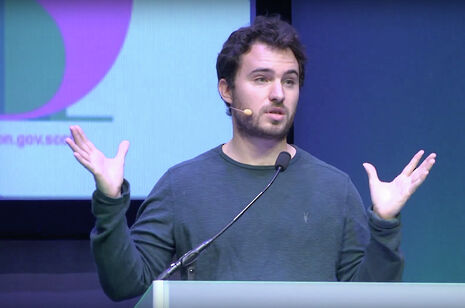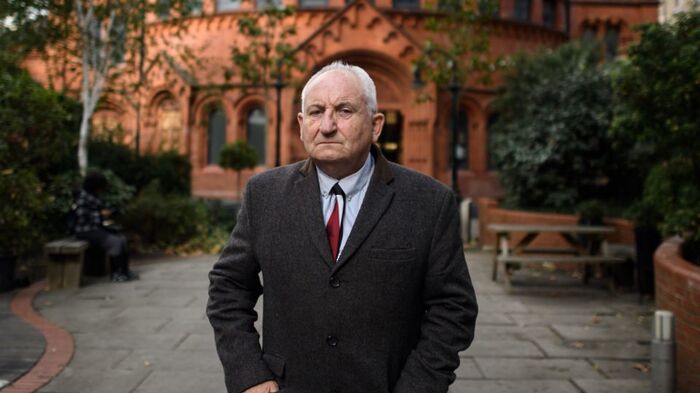Josh Littlejohn: ‘If you’re in a situation where you’re homeless … you feel invisible’
Oliver Rhodes talks to the founder of Social Bite, a sandwich shop chain dedicated to ending homelessness in Scotland

I am reminded of just how chronic this city’s homelessness problem is every time I walk down Regent Street. When I have some change, I’ll give what I can, but usually I just smile politely and apologise. Perhaps nothing illuminates the inequalities of Cambridge more than that familiar, bleak juxtaposition on a Saturday night of revelling students and rough-sleepers.
Josh Littlejohn is more aware than most of the tragedy of homelessness. Moments before his speech to the chamber of the Cambridge Union this week, I sat down with him to discuss his sandwich-shop chain, SocialBite, which employs nearly 30 people across Edinburgh, Glasgow and Aberdeen who lack permanent accommodation. Over the years he has met many homeless people, and got to know their stories. “We kept asking people their stories about how they became homeless and what was interesting, but also a bit spooky, is that they kept basically telling us the same story.” He goes on. “They usually suffered a very traumatic childhood, grew up in the care system ... and then they became homeless in their late teenage years.”
There are around 11,000 homeless people in Scotland, and 1,500 in Edinburgh alone. Littlejohn co-founded SocialBite in 2012 with the purpose of sending its profits to a range of local charities. In its original form it was a “one-dimensional business model”, but the business soon found its purpose when opportunity, literally, came knocking at the door. A Big Issue seller standing outside the shop “plucked up the courage to ask us for a job” and ever since, SocialBite’s mission has been clear. Littlejohn started offering more jobs to local homeless people, integrating them into the team. SocialBite also operates a system of “paying forward” whereby customers can pay for sandwiches and coffee on behalf of homeless people, who pick them up later in the day.
SocialBite has now become the centre of a much more ambitious effort to eradicate homelessness in Scotland. In 2015, Edinburgh’s high-street was nearly shut down when George Clooney visited the original shop, prompting a succession of high-profile publicity events which have included Leonardo DiCaprio, Prince Harry and Meghan Markle. “That was pretty cool,” Littlejohn remarks nonchalantly of the last two, to the laughter of the chamber.
“The big thing is the structural response to [homelessness] in terms of how our national and local governments typically respond.”
By offering stable employment for homeless people, Littlejohn’s project has proven to be a creative way of tackling an issue which is poorly understood. Too often, he argues, homelessness is conceived as a problem of “individual decision-making” involving alcohol or drug addiction. However, the stories he has heard from homeless people themselves have highlighted the extent to which this is a systemic issue. “It starts from childhood. Few realise how grim it is to be homeless or to be living in hostel accommodation or homeless bed-and-breakfasts … and we’re not really helping [people] get on their feet and get out of it quickly.”
Policy decisions, he argues, have not helped. “The big thing is the structural response to [homelessness] in terms of how our national and local governments typically respond. The systems they create are a bit flawed, and they send a lot of money the wrong way.” Access to permanent accommodation can be delayed by local authorities, and in the meantime, homeless people are either left to sleep on the streets, or channelled into hostel accommodation which can seriously impact on mental health, when people are packed in close-quarters with little privacy.
“The government has just created a new funding package for homelessness, which on the face of it is a good thing, but it’s going towards new hostel accommodation, and we know that this sort of accommodation, getting people together in a hostel, just doesn’t work, and it keeps people adrift from society.”
What matters, argues Littlejohn, is that homeless people are put into “mainstream” accommodation as quickly as possible, so that they can start leading normal lives. After SocialBite’s success, Littlejohn was inspired to set up his own housing projects for homeless people. “In more recent years we’ve started looking into projects about accommodation: there’s one called Housing First, which has been tried out on different scales all across the world, but mainly in Scandinavia.” Under this system, “you put the house at the first point of intervention”, rather than the last as is currently done. Tenants have to regularly prove they can maintain their tenancy, but the responsibility of living independently and paying rent provides residents not only with permanent accommodation, but a sense that their life is in their control. “Over 90% of residents hold their tenancy, and that’s how Finland has pretty much ended its homelessness problem.”
Littlejohn’s understanding of homelessness goes beyond policy however. His projects have each emphasised a commitment to putting homeless people within the boundaries of normality, providing a personal face to the issue. In 2016, SocialBite organised ‘Sleep in the Park’, an outdoor overnight event that took place on the coldest night of the year. Hundreds of people slept rough in Edinburgh’s central gardens to raise money for the SocialBite Village, a project which has housed 20 people since its launch in May last year. ‘Sleep in the Park’ has been going ever since. “One of the greatest things about the Village project is that the staff are pretty much indistinguishable from the people who are homeless. You can’t tell who are homeless, who are staff and who are volunteers: it’s just human beings living in a nice place.”
He gives some advice to those who are keen to make a difference on a personal basis. “If you’re in a situation where you’re homeless, you’re outwith society and you feel that. You feel invisible, you know that you are sub-value to everyone else. So I think a big thing you could do is treat people like human beings. Say ‘hi’, have a chat. I wouldn’t be averse to giving money either.”
Homelessness, more so than ever, seems to be an insurmountable problem. Yet too often, it seems, attempts to solve it are administrative when they should be interpersonal. During his speech, he emphasises the need to “think creatively” and not rely on the government to sort it out by themselves. “It’s not about resources but about focus”, he says.
 News / Downing Bar dodges college takeover31 January 2026
News / Downing Bar dodges college takeover31 January 2026 Comment / College rivalry should not become college snobbery30 January 2026
Comment / College rivalry should not become college snobbery30 January 2026 Fashion / A guide to Cambridge’s second-hand scene2 February 2026
Fashion / A guide to Cambridge’s second-hand scene2 February 2026 Lifestyle / Which Cambridge eatery are you?1 February 2026
Lifestyle / Which Cambridge eatery are you?1 February 2026 News / Deborah Prentice overtaken as highest-paid Russell Group VC2 February 2026
News / Deborah Prentice overtaken as highest-paid Russell Group VC2 February 2026








